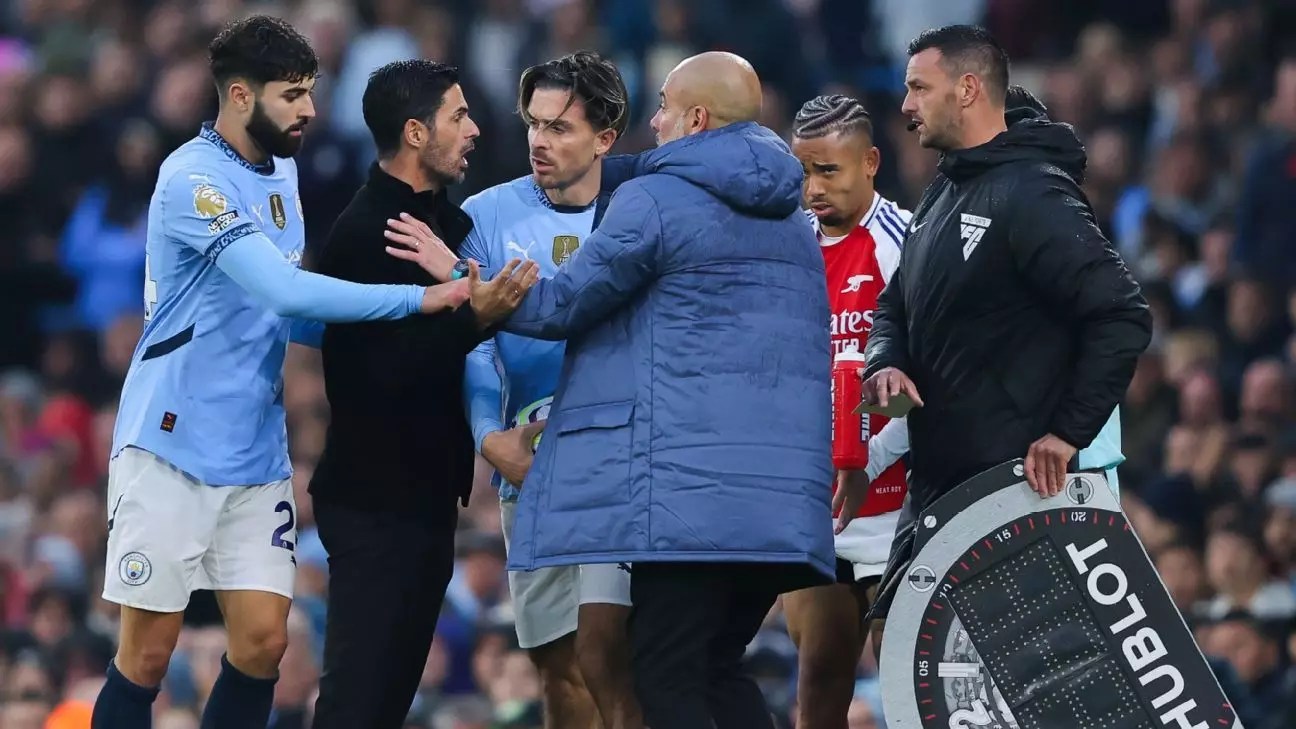When Arsenal faced Manchester City during their intense encounter at the Etihad Stadium, tempers flared both on and off the pitch. Following the dramatic 2-2 draw, marked by a last-minute equalizer from City’s John Stones, accusations flew regarding Arsenal’s gameplay and tactics. Mikel Arteta, the Arsenal manager, found himself defending his team against claims of employing “dark arts”—a term that implies underhanded or unsportsmanlike conduct—in the heat of a tightly contested match.
In their post-match reflections, several Manchester City players voiced their displeasure with Arsenal’s performance, labeling their tactics as cunning, if not outright dirty. Stones notably criticized the Gunners for allegedly resorting to time-wasting strategies while trying to protect a slender lead, particularly after Arsenal was reduced to ten men with Leandro Trossard’s dismissal. This added an edge to an already fierce rivalry, spotlighting how football debates can often dominate the narrative post-match, sometimes overshadowing the event itself.
Arteta’s response to these allegations was measured. As a manager under pressure, he stressed the importance of facts over emotional reactions, stating that he would prefer to discuss the situation based on the actual status of his players rather than conjecture. This underscores a crucial aspect of his leadership style; he seeks to maintain a rational perspective amidst the chaos that often accompanies high-stakes matches.
In the aftermath of the game, injury concerns compounded the situation for Arsenal. Players like Gabriel Martinelli, Jurriën Timber, and Riccardo Calafiori were substituted due to fitness issues, with goalkeeper David Raya notably leaving the stadium with a bandaged knee. Arteta’s concern for his player’s physical well-being was apparent, as he highlighted that several squad members might not be available for upcoming matches, placing the focus squarely on their health and fitness rather than the controversies surrounding tactical choices. This pivot serves to remind fans and pundits alike that the physical strain of modern football can directly impact tactical decisions—a factor often overlooked in the analysis of performance.
While talking about the alleged “dark arts,” Arteta drew attention to moments where Manchester City engaged in similar time-wasting practices when they found themselves reduced to ten men. His argument pointed to a shared human instinct among teams to manage games under tactical duress rather than painting one side as the villain. This reflection sheds light on the competitive nature of football; every team faced with challenges on the pitch instinctively adapts, often culminating in shared practices across the league.
Reflecting on Growth and Learning
Arteta emphasized the importance of learning from past experiences, reflecting on previous fixtures where Arsenal faced similar adversarial conditions. He recalled the painful 5-0 defeat to City in August 2021, specifically noting the lessons that come from adversity. By recognizing their history, Arteta portrayed a sense of maturity within his squad—a quality that is invaluable for any team aspiring to climb the ranks in competitive leagues. The notion that the team needed to “play the game that [they] had to play” further illustrates the tactical nuance required to navigate challenging match situations effectively.
Amid the post-match drama, one of the more intriguing moments involved City striker Erling Haaland, who was caught on camera reminding Arteta to “stay humble.” This interaction encapsulated the emotional rollercoaster that high-level competition often entails, with players operating in a realm where respect and rivalry coalesce. Arteta’s choice to view these exchanges as part of the game highlights his understanding of the sport as a complex interplay of emotion, competition, and, ultimately, professionalism.
As the Premier League unfolds, the rivalry between Arsenal and Manchester City will likely continue to be a focal point. Arteta’s balanced response to accusations of unsporting behavior reflects not only his desire to protect his team but also to maintain a broader perspective on the game’s integrity. Beyond the rivalry, these events remind fans that football is not just about winning or losing; it is about growth, adaptation, and interpretation. Ultimately, the narrative surrounding teams, their strategies, and their interactions is as much a part of the sport as the matches themselves.


Leave a Reply